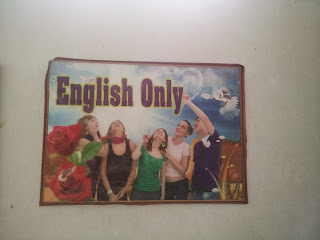There are two worlds -- one above, one below, like the movie Upside Down, except that the other world is not inverted and no one could tell which world you are from. It used to be air-raid shelters, the underground of Shuang Qiao, Chaoyang district, but now some of them have become homes for an estimated one million outsiders from other provinces who come here to chase their dreams. Though these tenants do not enter the building by the main entrance, like residents living above the ground do, they never sink into oblivion in this flourishing city.
In this harsh yet dreamy Age...
It just so happens that I got a friend who lives underground, so I stayed there for a few days and get to know more about the underground world. Down one and two flights of stairs live 80 occupants, coming and going through the dim, musty tunnel everyday. That underground housing apartment locates in Shuang Qiao, Chaoyang district, and, for second hand flats above ground, costs 26,000 yuan per sq meter in September, 2013 and it keeps rising. (Source: http://bj.ganji.com/) Rents for underground rooms fluctuate very often due to demands on different times. For example, flocks of drifters coming to Beijing after Lunar New Year not only jacked up the price, but also created a supply shortage. However, price drops during summer time because not everyone could stand that stuffy environment. As for the rent of the rooms, tenants said it varied a lot, "it is a mutually agreed price between the landlord and the tenant. Remember to bargain!" I asked several tenants and was told that the rent for a room of 15 square meter in size with window costs 450 yuan, whereas the other windowless room of 7 square meter in size costs 300 yuan. (A casual actor in Beijing earns 30-60 yuan per day) They know that it isn't easy to survive in the capital, but it is never a hindrance for them.
"I've got a reason to live."
Quan Quan moved to Beijing from Hubei, his hometown, a year ago when he was 22 and has been living underground since then. In 2011, he made it to top 8 out of 2000 participants on Hubei Collegers' Got Talent. He could still recall, during the competition, his parents were ashamed of him, thinking that he was day-dreaming to be a star. However, Quan was so determined and his efforts blossomed. He also credited Yang Di, a contestant on China’s Got Talent nicknamed "The King of Facial Expressions", for inspiring him to develop his own comedic style. (Videos of Quan participating in the contest could be found at the bottom of this article.) "I've got a reason to live." Quan said confidently. After he was graduated, he insisted moving to Beijing for better opportunity under his parents' strong opposition. Today, Quan, from a no-name casual actor a year ago, has become a senior agent recruiting casual actors for media groups. Life is more stable but he never forget his dream to become a comedy actor, and then a director. These years of backstage work allows him to build up a social network and his plan is to set up a media agency to advertise for himself. At least he, himself, recognizes his efforts.
“We are unbeatable, like cockroaches."
Accumulation of radon in these tightly-sealed underground shelters, the musty and stale air, the absence of emergency exits and legitimacy of such dwellings... these are no doubt health and safety concerns for tenants, and they all know about it. Nonetheless, what they also know is the sky-high rental price for housing in Beijing. Adding that these Beijing drifters may come with packaged family burden besides their ambitions, they for sure want to lead an austere life. And underground rooms become their best option. At the time I stayed in underground rooms, Quan's younger brother, who was studying university in Hubei and was on his summer break, also came to Beijing for work, or, for opportunities. For Quan, he only wish him to be anything but not Foxconn-type mechanic factory worker. Although life is less hard than a year ago, Quan has no plans to move out yet. "After all, earning good money doesn't mean you can afford your own apartment in Beijing. And, up till now, my body seems alright. So, why not just save the money on housing and then I could fulfil my dream earlier?" Quan describes those drifters living underground as cockroaches, for they are tough and adaptive. "Nothing can stop us. We are unbeatable, like cockroaches." He believes that hard work would finally pay off.
Quan is not representative of the Beijing drifters living underground. Ask a drifter and every one of them has a fascinating story to tell. More interestingly, a sardonic fact is that the demands of these housing which is considered as grey zone in law often outgrown supply despite government's order to clear them out on 2010. With little daylight in, dwellers seem always live in darkness. Of course it can be the darkness of despair, but, at least to me, it is more like the darkness of being under magicians' black cloth and that no one could have known how you are going to surprise the world.
兩個世界,一個在上、一個在下,像電影《Upside Down》(大陸譯名 「逆世界」)中的場景,只是沒有顛倒,而且出門後沒有人能看出你是屬於哪個世界。朝陽的小區地下,從前是防空洞,今天成了供不應求的地下室,住戶主要為北京外來人口,他們雖不以樓房的正門出入,但也同住在這個繁華絢麗的城市裹,追逐自己的夢想。
這是一個既真實又夢幻的年代
因緣際會,得以在北京市朝陽區一間地下室住了數天,對這北京獨有的生態多了一點認識。那裏共有兩層,地下一層及二層,共住了約八十戶,每天也有人遷出遷入。地下室所處的小區今年九月的二手房評估單價為每平米二萬六千元(人民幣,下同)(資料來源:北京趕集網),至於地下室的租金則為海鮮價,供應緊張時(尤其春節過後北京湧現更多北漂)租金上升卻一房難求,夏天悶熱,較少人願意住,令租金下調。問了幾位租戶,大約十五平米帶窗的房子月租四百五十元,另一間約七平米無窗戶的月租為三百元,租戶們都補上一句「還一下價就可以便宜一點」。(北京群眾演員的日薪三十至六十元)在首都的生活雖不容易,卻無阻追夢。
「我還是有我存在的道理」
是2011年的湖北高校達人秀和表情帝楊迪把他帶到北京,全權今年廿三歲,湖北人,已經在北京工作了一年,一直住在地下室。當年,父母說他参賽是「丟人現眼」,他卻認為那是他「破繭成蟲」的機會,全靠觀摩楊迪的表演,加上自己的一些想法,結果在二千名參賽者中得第八名,他自信的說了一句:「我還是有我存在的道理。」湖北的發展空間有限,畢竟非一線城市。全權的表演慾並不是那般容易撲息,因此畢業後,在父母的反對下隻身來到北京,希望得到一個機會。今天沉澱下來,從一年前的其中一個收入不穩的群眾演員、到小群頭,直至今天成為大群頭,全權從未忘記自己的理想:成為一個喜劇演員,然後成為導演,有自己的作品。現在的他以開傳媒公司為目標,藉著這幾年幕後的經驗,建立的人脈關係,逐步實現夢想。不怕沒有人賞識,最少自己肯定自己。
「我們如蟑螂般打不死」
氡氣的積聚影響健康、潮濕的環境令細菌易滋生,加上防火安全問題,這些居於地下室的潛在風險,租戶其實很清楚,只是北京房價之高難以負擔,再說就是這些北漂來到北京,背上或許不止有自己的夢,還有家人的期望,大多都是生活上能省便省,有個地方睡便是了。提起家,全權的弟弟在湖北讀大學,也趁暑假來北京當群眾演員,多賺點錢自然是好,其實是想尋找機遇,對全權來說,只希望弟弟不要當電子工這類機械式的工作就行了。全權的收入比一年前剛來北京時多了,生活也較穩定,但仍未有打算搬離地下室,「始終北京的房子不好找,身體暫時也沒有什麼不適,而且多省點錢,便能快點達成夢想,不是更好嗎?」全權形容自己有如蟑螂般打不死,在北京的生存條件再艱難,他也相信憑自己的努力能幹出一點成績來。
全權,只是其中一個住在地下室的北漂而已,像他那樣來北京的每個人也有自己的故事;而地下室的居住問題屬中國法律中的灰色地帶,政府整頓了多年也只聞其言,未見其行,任由這個都市計時炸彈埋於地下。現時的北京,起碼有過百萬人住在地下室,沒有陽光,分不到白晝或是黑夜,有如在魔術師的黑布下,這些帶著夢想前來的人,在布幕揚起的一刻前,旁人永遠猜不到黑布下的你能變成什麼。
Videos of Quan Quan on Hubei Collegers' Got Talent 全權参賽視頻:



